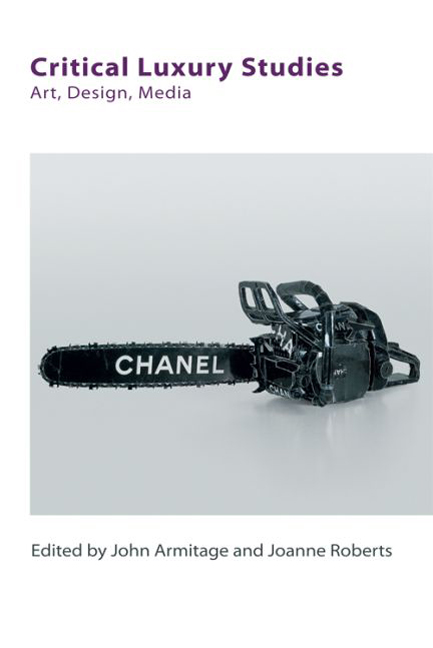Book contents
- Frontmatter
- Contents
- List of Figures
- List of Tables
- Series Editors’ Preface
- Acknowledgements
- Notes on Contributors
- 1 Critical Luxury Studies: Defining a Field
- I CRITICAL LUXURY STUDIES
- 2 Knowing Luxury: From Socio-Cultural Value to Market Price?
- 3 Luxury: A Dialectic of Desire?
- 4 The Luxury Duality: From Economic Fact to Cultural Capital
- 5 ‘Life's Little Luxuries?’ The Social and Spatial Construction of Luxury
- 6 The Object and Art of Luxury Consumption
- II ART, DESIGN, MEDIA
- Index
4 - The Luxury Duality: From Economic Fact to Cultural Capital
from I - CRITICAL LUXURY STUDIES
Published online by Cambridge University Press: 23 September 2017
- Frontmatter
- Contents
- List of Figures
- List of Tables
- Series Editors’ Preface
- Acknowledgements
- Notes on Contributors
- 1 Critical Luxury Studies: Defining a Field
- I CRITICAL LUXURY STUDIES
- 2 Knowing Luxury: From Socio-Cultural Value to Market Price?
- 3 Luxury: A Dialectic of Desire?
- 4 The Luxury Duality: From Economic Fact to Cultural Capital
- 5 ‘Life's Little Luxuries?’ The Social and Spatial Construction of Luxury
- 6 The Object and Art of Luxury Consumption
- II ART, DESIGN, MEDIA
- Index
Summary
On Capital and Labour
Luxury has to be regarded simultaneously as an economic fact and as a medium to communicate social relationships. Like the physical definition of light as the duality of particle and waveform, the luxury duality manifests itself as material element and fluid phenomenon; it is a quantitative measure of capital (economic) as much as a qualitative measure of labour (social).
Capital is set within specific economic parameters; at any given time capital is the accumulated labour, in the form of materials, facilities, technologies, that serves as a means of (new) production. From this definition, Karl Marx – in 1847, at a time when the production of luxury commodities was set explicitly against industrialised manufacture – expanded the definition of capital thus:
Capital consists not only of means of subsistence, instruments of labour, and raw materials, not only as material products; it consists just as much of exchange values. All products of which it consists are commodities. Capital, consequently, is not only a sum of material products, it is a sum of commodities, of exchange values, of social magnitudes. (Marx 1977: 212)
Since the relationship between commodities mirrors as well as produces social relationships, the above defines capital as the social relation of production. At the end of this (material) production comes the commodity that, in the present context of luxury, reflects at the same time the accumulated labour invested in its making as much as it transfers the social relationship of production into a social hierarchy where this relationship is demarcated through exclusive access and socio-economic dominance. Luxury goods serve as the reified and commodified expression of the social relationship of their production. In principle, this role is assumed by any object within a capitalist economy, but in luxury the role of capital as accumulation of exchange – as well as symbolic values and of the ‘social magnitudes’ that ratify dependencies – is particularly pronounced. Since aspects of need or function are secondary to luxury, the relational aspects within its social meaning are paramount.
The above quote from Marx on capital situates my discussion within the realm of a materialist political economy, where I consider a very fruitful debate on luxury to be situated.
- Type
- Chapter
- Information
- Critical Luxury StudiesArt, Design, Media, pp. 67 - 87Publisher: Edinburgh University PressPrint publication year: 2016



